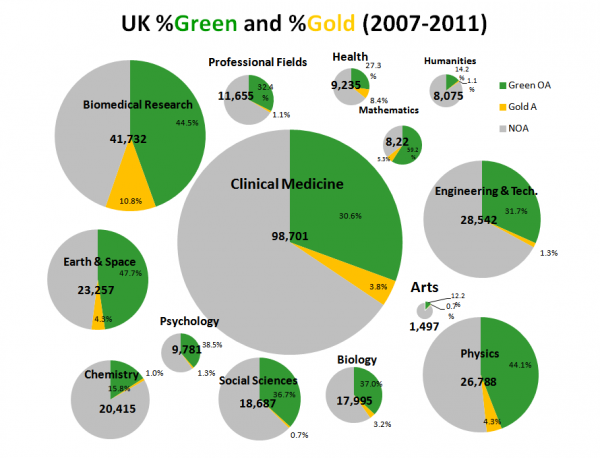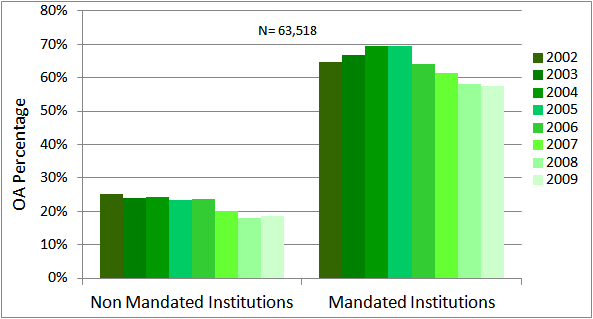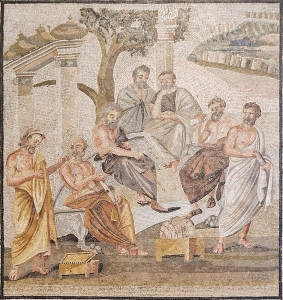 Written evidence to House of Lords Science and Technology Select Committee on Open Access
Written evidence to House of Lords Science and Technology Select Committee on Open Access
Stevan Harnad
I. Overview of OA
1. Open Access (OA) means
free online access to peer-reviewed research journal articles. (There are
about 28,000 such journals, in all fields and languages.)
2. Most research journals recover their publication costs through institutional subscriptions.
3. No institution can afford to subscribe to all or most or even many of the 28,000 journals, only to a
small fraction of them, a fraction shrinking because of rising journal costs.
4. As a result, all researchers today, at all institutions, are denied access to articles published in those journals whose subscriptions are unaffordable to their institutions.
5. As a result, the research that is funded by public tax revenue, and conducted by researchers employed by publicly funded institutions (universities and research institutes) is not accessible to all of its primary intended users – the researchers who can
use, apply and build upon it, to the benefit of the public that funded it.
6. The Internet and the Web have made it possible to
remedy this access-denial problem, which had been a legacy of the Gutenberg era of print on paper, and its associated costs.
7. Researchers can continue to publish their research in subscription journals, but they can
self-archive their final, peer-reviewed drafts in their institutional repositories, free for all online, as a supplement, for all users whose institutions cannot afford subscription access to the journal in which the article was published (and, as an added bonus, free also for the tax-paying public that funded the research).
8. Author self-archiving is called “
Green OA.”
9. Sixty percent of journals (including most of the top journals in most fields) already endorse Green OA self-archiving by authors, immediately upon publication (no embargo).
10. The remaining 40% of journals request an embargo or delay on providing OA for 6-12 months or more. (The publisher rationale for the embargo is that it protects journal subscription revenues that Green OA might otherwise make unsustainable.)
11. There is as yet no
evidence at all that immediate, un-embargoed Green OA self-archiving reduces subscriptions, even in fields, such as physics, where it has been practiced for over 20 years and has long reached close to 100%.
12. The second way to provide OA is for the journal rather than the author to make all of its articles freely accessible online immediately upon publication.
13. OA journal publishing is called “
Gold OA.”
14. About 20% of the world’s 28,000 journals are Gold OA journals, but very few of them are among the top journals in each field.
15. Most Gold OA journals continue to cover their costs from subscriptions (to the print edition) but the top Gold OA journals have no print edition and instead of charging the user-institution for access, through subscription fees, they charge the author-institution for publishing, through publication fees.
16. There are also
hybrid subscription/Gold journals, who publish non-OA articles and continue to charge institutional subscription fees, but offer authors the option of paying to make their individual article OA if they pay a Gold OA fee.
17. Paying Gold OA fees is a problem for authors and their institutions because as long as most journals are still subscription journals, institutions have to continue subscribing to whatever journals they can afford that their users need.
18. Hence paying for Gold OA today increases the financial burden on institutions at a time when subscription costs are already barely affordable.
19. Paying for Gold OA while subscriptions still need to be paid is not only an extra financial burden, but it is also unnecessary, because
Green OA can be provided for free while worldwide subscriptions are still paying the cost of publication.
20. If and when Green OA becomes universal (i.e., at or near 100%, in all fields, worldwide), and if and when that, in turn, makes subscriptions unsustainable (with institutions cancelling subscriptions because the free Green OA versions are sufficient for their needs), then all journals can
convert to Gold and institutions will have the money to pay the Gold OA costs out of their annual windfall subscription cancelation savings.
21. There is every reason to believe that
Gold OA costs after universal Green OA will be much lower than they are today: the print edition and its costs as well as the online edition will be gone, the worldwide network of Green OA
Institutional Repositories will provide access and archiving, and journals will only need to manage peer review (all peers already review for free) and perhaps provide some copy-editing.
22. It remains to explain how to achieve universal Green OA, so as (1) to provide universal OA, first and foremost, and then (2) to induce a transition to universal Gold OA at an affordable price if and when Green OA makes subscription publishing unsustainable, and (3) to release the institutional subscription funds in which the potential money to pay for Gold OA is currently locked.
23. The way to achieve universal Green OA is for institutions (universities and research institutes) and research funders to
mandate (require) that all research that they fund, and that they employ researchers to conduct, must not only be published, as now (“publish or perish”), but the peer-reviewed final drafts must also be deposited in the researcher’s institutional repository immediately upon acceptance for publication.
24. Optimally, access to the deposit should be made OA immediately; in any case any OA embargo should be as short as possible.
25. However, if necessary, an embargo of 6 months or even 12 months or longer can be tolerated in the case of the 40% of articles published in journals that do not yet endorse immediate Green OA.
26. The repositories make it possible for authors to provide “
Almost-OA” to the deposits that are under OA embargo by automatically forwarding reprint requests from would-be users to the author, who can then decide, with one click, whether or not hey wish to email the deposited reprint to the requester.
27. Researchers have been fulfilling reprint requests from fellow-researchers for over a half century, but in the online era this can be greatly facilitated and accelerated through universally mandated repository deposit.
II. UK OA Policy
28. In
2004, the UK Parliamentary Select Committee recommended that UK universities and UK funding councils mandate Green OA self-archiving.
29. With this, the UK became the world leader in OA and OA policy.
30. Green OA self-archiving has since been mandated by both funding councils and universities in the EU, Canada, and Australia, including the
National Institutes of Health,
Harvard, and
MIT in the US (
over 250 Green OA mandates worldwide to date).
31. Green OA mandates have been
growing worldwide, guided by the UK model; to accelerate mandate adoption all that is needed is a few
practical upgrades to the UK model (such as upgraded compliance mechanisms and fuller integration of institutional and funder mandates).
32. But in 2012, instead of building on its 8-year success in worldwide OA leadership, the UK took an abrupt U-turn on OA, with the recommendations of the
Finch Committee.
33. The Finch Committee declared Green OA a failure, and recommended downgrading it to just preservation archiving.
34. In place of mandating Green OA (which is almost cost-free, while publishing is still being paid for worldwide via institutional subscriptions) the Finch Committee recommended paying even more for publishing, by redirecting scarce UK research funds to paying for Gold OA, over and above what the UK is already paying for subscriptions.
35. One can only conjecture as to the causes underlying this inexplicable about-face when Green OA mandates are growing worldwide:
36. The cause may have been subscription-publisher lobbying of BIS against Green OA or Gold-OA-publisher lobbying for Gold OA.
37. There was perhaps also some pressure from a vocal minority of OA advocates arguing that there is an urgent immediate need for something stronger than the free online access mandated by Green OA (the additional re-use rights conferred by a
CC-BY license) for which this minority claimed that it is worth paying Gold OA fees.
38. The outcome has been significantly to weaken instead of strengthen the
RCUK OA policy:
39. RCUK researchers may still choose between paying for Gold OA or providing cost-free Green OA, but RCUK expresses a
preference for Gold and does not permit researchers to choose Green if their chosen journal’s OA embargo exceeds 6-12 months.
40. This policy has the
perverse consequence of giving subscription publishers a strong incentive (1) to add a hybrid Gold option just in order to collect the extra UK revenue, and (2) to adopt and extend Green OA embargoes beyond the UK’s allowable 6-12 months, to make sure that UK researchers must choose the paid Gold option rather than the cost-free Green one.
41. The rest of the world cannot, need not, and will not follow suit with this profligate. perverse, and completely unnecessary UK policy change.
42. In Europe, the Americas and Asia, low-cost Green OA mandates will continue to grow, while the UK loses its leadership role in worldwide OA, needlessly squandering increasingly scarce research funds, paying publishers even more in order to make UK research output (
and UK research output alone -- 6% of worldwide research output) OA, while the rest of the world makes its (94%) research output OA at next to no extra cost.
The Australian economist, John Houghton, has analyzed OA policy in country after country. The House of Lords Select Committee is urged to look at the outcome of those analyses, which is that it is far cheaper to mandate Green OA first, rather than to pay pre-emptively for Gold unilaterally. That not only provides OA, but it paves the way to affordable, sustainable Gold OA:
Houghton, J. & Swan, A. (2013) Planting the Green Seeds for a Golden Harvest: Comments and Clarifications on "Going for Gold" D-Lib Magazine Volume 19, Number 1/2
Conclusion: Instead of following the Finch Committee’s counterproductive recommendation to require and subsidise Gold OA, RCUK should adopt two important practical upgrades to strengthen the prior RCUK Green OA mandate: (1)
integrate institutional and funder Green OA mandates so they can mutually reinforce one another and (2) implement an effective Green OA
compliance mechanism, making institutions responsible for monitoring and ensuring compliance with both institutional and funder deposit mandates.
Appendix:
Comments on the Committee's specific topics:"support for Universities in the form of funds to cover article processing charges, and the response of universities and other HEIs to these efforts"
If there are UK funds to spare to subsidise Gold OA, fine, make them available -- but mandate (require) Green OA self-archiving in all cases (ID/OA) and do not require researchers to choose a Gold OA journal unless they wish to."embargo periods for articles published under the green model"
The shorter the better, but always require immediate deposit (ID/OA) in the author’s institutional repository, even for embargoed articles, and implement the “Almost OA” Button during the embargo."engagement with publishers, universities, learned societies and other stakeholders in the development of research council open access policies and guidance"
Publishers should endorse immediate Green OA, but ID/OA mandates are compatible with embargoes.
Universities should mandate Green OA too.
Funder and university mandates should be convergent, requiring deposit in the institutional repository, with the institution monitoring and ensuring compliance.
Deposits or their metadata can then be harvested to any desired central repositories.
Repository deposit should be designated the sole mechanism for submitting publications for institutional performance review or national research assessment.
Learned Society publishers, like all publishers, should endorse immediate Green OA, but ID/OA mandates are compatible with embargoes.
If and when universally mandated Green OA makes subscription publishing unsustainable, publishers can convert to Gold OA and institutions can pay for it out of the windfall subscription cancelation savings freed by the Green-OA-induced cancelations."challenges and concerns raised by the scientific and publishing communities, and how these have been addressed.
"The UK scientific community has rightly expressed considerable concern about (1) not being allowed to publish in their journals of choice, and about (2) having to pay for Gold OA.
The solution is to mandate Green OA and not to require Gold OA except if the author wishes it.
The UK subscription publishing community is being paid in full for publication, via worldwide subscriptions today.
If and when universally mandated Green OA makes subscription publishing unsustainable, publishers can convert to Gold OA and institutions can pay for it out of the windfall subscription cancelation savings freed by the Green-OA-induced cancelations."international issues"
The rest of the world need not, cannot, and will not follow the Finch Committee’s recommendation to pay pre-emptively for Gold instead of mandating Green OA.
It would be best if the UK returned to the direction it set in 2004; otherwise it is simply using UK research funds to provide (Gold) OA for the UK and the world at a much higher cost than necessary, and at the cost of inducing perverse effects in publishers (such as subscription publishers offering hybrid Gold in order to attract double payment for UK’s Gold subsidy, and adopting and increasing OA embargoes in order to ensure that UK researchers must pay extra for Gold OA).
 Figure 1.
Figure 1. The percentage of Green and Gold OA in the UK (2007-2011, Web of Science). Note that most OA is Green OA. From: Gargouri, Y, Lariviere, V, Gingras, Y, Carr, L and Harnad, S (2012b)
Green and Gold Open Access percentages and growth, by discipline. In: 17th International Conference on Science and Technology Indicators (STI), Montreal, CA, 05 - 08 Sep 2012. 11pp.
 Figure 2.
Figure 2. The effect of Green OA mandates (comparing nonmandated vs mandated OA provision: 2002-2009). Data from Gargouri, Y, Lariviere, V, Gingras, Y, Brody, T, Carr, L and Harnad, S (2012a)
Testing the Finch Hypothesis on Green OA Mandate Ineffectiveness. Presented:
Open Access Week 2012






